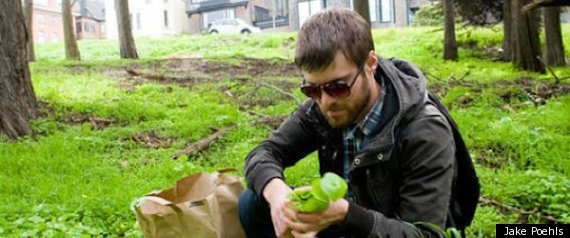Iso Rabins has always done a delicate tango around environmental and food regulations. Rabins pioneered the Bay Area's burgeoning wild-foods movement when he founded ForageSF in 2009, but city health inspectors, noting the potential hazards of eating products gathered in the wild -- the best-known of which come in the form of poisonous mushrooms -- were never thrilled with his organization or its various commercial offshoots.
Earlier this year, one of Rabins' signature ventures -- the Underground Market, a wildly successful event at which various sub-professional food producers peddled their wares -- was shut down by the Department of Public Health, which had previously given the market its tacit blessing. Rabins has since been working to bring the Underground Market into compliance with city law.
But this fall, during that process, he suddenly faced persecution on another front. In October, city officials sent a letter informing him that another series of foraging get-togethers, his so-called Wild Kitchen dinners, could subject him to thousands of dollars in fines. The dinners typically served dozens of patrons, each paying $40 or more for a prix fixe menu of hunted and foraged local foods such as squid, mushrooms, and nettle soup.
(Disclosure: SF Weekly profiled Rabins for a cover story in 2009. I attended two Wild Kitchen dinners in the course of reporting for that article, and have since attended one more. They were tasty, and I never got sick.)
In a letter dated Oct. 26, Richard Lee, director of Environmental Health Regulatory Programs for DPH, told Rabins that the dinner series "constitutes an existing and ongoing violation of state and local law." Each two-day Wild Kitchen event, Lee said, could bring a fine of $1,063. Lee noted that at least six such events had been recorded by health inspectors this year alone.
Rabins took his case before DPH Environmental Health Director Rajiv Bhatia at a hearing last week, arguing that he had not been properly notified of potential legal violations before being hit with the fines. "I was never informed I had to get a permit until Oct. 26, after which I did get permits," Rabins said.
Turns out he had a point. "When is the first time he was notified, verbally or in writing?" Bhatia asked health inspector Alicia Saam, who testified against Rabins at the hearing. "That's a good question," Saam replied. Bhatia, not impressed, let Rabins off the hook. "I'm going to go ahead and waive the fee, because he wasn't told he had to get a permit," he said.
Rabins' Wild Kitchen dinners are now officially on the right side of the law, with all food prepared in commercial kitchens under strict safety guidelines. (He maintains that the dinners were always "very safe" before the Health Department showed up.) But the new veneer of regulatory compliance has changed the dinners' spontaneous atmosphere, Rabins says.
"Unfortunately, it really takes away from the life of the dinners, but I guess that's what [health officials] need," he says.
Original Article
Source: Huff
Earlier this year, one of Rabins' signature ventures -- the Underground Market, a wildly successful event at which various sub-professional food producers peddled their wares -- was shut down by the Department of Public Health, which had previously given the market its tacit blessing. Rabins has since been working to bring the Underground Market into compliance with city law.
But this fall, during that process, he suddenly faced persecution on another front. In October, city officials sent a letter informing him that another series of foraging get-togethers, his so-called Wild Kitchen dinners, could subject him to thousands of dollars in fines. The dinners typically served dozens of patrons, each paying $40 or more for a prix fixe menu of hunted and foraged local foods such as squid, mushrooms, and nettle soup.
(Disclosure: SF Weekly profiled Rabins for a cover story in 2009. I attended two Wild Kitchen dinners in the course of reporting for that article, and have since attended one more. They were tasty, and I never got sick.)
In a letter dated Oct. 26, Richard Lee, director of Environmental Health Regulatory Programs for DPH, told Rabins that the dinner series "constitutes an existing and ongoing violation of state and local law." Each two-day Wild Kitchen event, Lee said, could bring a fine of $1,063. Lee noted that at least six such events had been recorded by health inspectors this year alone.
Rabins took his case before DPH Environmental Health Director Rajiv Bhatia at a hearing last week, arguing that he had not been properly notified of potential legal violations before being hit with the fines. "I was never informed I had to get a permit until Oct. 26, after which I did get permits," Rabins said.
Turns out he had a point. "When is the first time he was notified, verbally or in writing?" Bhatia asked health inspector Alicia Saam, who testified against Rabins at the hearing. "That's a good question," Saam replied. Bhatia, not impressed, let Rabins off the hook. "I'm going to go ahead and waive the fee, because he wasn't told he had to get a permit," he said.
Rabins' Wild Kitchen dinners are now officially on the right side of the law, with all food prepared in commercial kitchens under strict safety guidelines. (He maintains that the dinners were always "very safe" before the Health Department showed up.) But the new veneer of regulatory compliance has changed the dinners' spontaneous atmosphere, Rabins says.
"Unfortunately, it really takes away from the life of the dinners, but I guess that's what [health officials] need," he says.
Original Article
Source: Huff

No comments:
Post a Comment